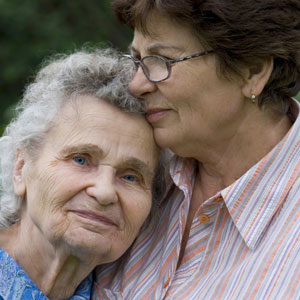 According to the National Alliance for Caregiving in their 2020 report, there are nearly 53 million caregivers in the United States, and nearly 1 in 5 are providing unpaid care to an adult with health or functional needs.
According to the National Alliance for Caregiving in their 2020 report, there are nearly 53 million caregivers in the United States, and nearly 1 in 5 are providing unpaid care to an adult with health or functional needs.
A caregiver is anyone who provides help to another person in need, such as an ill spouse or partner, a disabled child, or an aging relative. Family members who are actively caring for an older adult often don’t identify themselves as a caregiver.
Caregiving can have many rewards. For most people in that role, being there when a loved one needs you is something you want to do and is very important. However, caring for a loved one can strain even the most resilient of people. Recognizing that you are a caregiver can help you to seek out and receive the support you need.
A shift in roles and emotions can bring on anger, frustration, exhaustion, sadness, and a feeling of isolation. Caregiver stress – the emotional and physical stress of caregiving – is common. Finding balance is key to maintaining your own health and well-being.
As a caregiver, you may forget your own health requirements or emotional needs, which can in turn create anxiety and tension. Here are some signs of caregiver stress:
- Feeling overwhelmed or worried all the time
- Being tired a lot of the time
- Getting too much sleep or not enough
- Being easily irritated or angry
- Feeling sad
- Losing interest in activities you used to enjoy
- Gaining or losing weight
- Having physical problems, pain, frequent headaches
- Abusing alcohol, prescription medications, or drugs
Too much stress can cause all sorts of problems, particularly if the stress continues over a long period of time. As a caregiver, you can experience symptoms of depression or anxiety. You may not be eating a balanced diet or getting enough physical activity or sleep. This can increase your risk of medical problems, including heart disease and diabetes.
There are strategies for dealing with caregiver stress, but it starts with recognizing that you need to take care of yourself in order to be able to care for anyone else.
To help manage caregiver stress:
Accept help. List the ways – even small things – that others can help with. When help is offered, let the individual choose what he or she would like to do. For example: Prepare a meal; sit with or read to the person you care for; run an errand; pick up groceries; drop off or pick up your children when you are caregiving.
Know what you can and cannot provide. No one person is the “perfect” caregiver. Know that you are doing the best you can and you may need to elicit support from professionals.
- Set realistic goals.Establish a daily routine. Create prioritized lists. Divide large tasks into smaller steps that can be achieved. Learn to say, “No” to requests that are draining, such as hosting holiday get-togethers.
- Get connected. Research caregiving resources in your community. If possible, attend classes about the disease your loved one is experiencing. Take advantage of caregiving services, such as transportation, meal delivery, or housekeeping help.
- Join an online or in-person support group.A support group can provide validation and encouragement, as well as problem-solving strategies for difficult situations.
- Maintain connections.Try to stay well-connected with family and friends who can offer nonjudgmental emotional support. Set aside time each week for connecting, even if it’s just a walk or phone call with a friend.
- Establish personal health goals. Set goals to establish a good sleep routine, find time to be physically active on most days of the week, eat a healthy diet, and drink plenty of water. Be sure to get recommended vaccinations and screenings. Make sure to tell your doctor that you are a caregiver. Don’t hesitate to mention any concerns or symptoms you have.
Respite care
Taking a break can be one of the best things you can do for yourself and for the person you are caring for. A respite from daily caregiving will help you to destress and you’ll return refreshed. Most communities have some type of respite care available, such as:
- Adult care centers and programs. Some centers provide care for both older adults and young children, and the two groups may spend time together.
- In-home respite.Health care aides come to your home to provide companionship, nursing services, or both.
- Short-term care.Some assisted living homes, memory care homes and nursing homes accept people needing care for short stays while caregivers are away.
The caregiver who works outside the home
Over 60 percent of caregivers work outside of the home. If you are in this position and you are feeling overwhelmed, think about taking a leave from your job for a period of time.
Employees covered under the federal Family and Medical Leave Act may be able to take up to 12 weeks of unpaid leave a year to care for relatives. Ask your human resources office about options for unpaid leave.
You aren’t alone.
If you’re like many caregivers, you have a hard time asking for help.
Rather than struggling on your own, take advantage of local resources for caregivers. Get started by checking out the National Alliance for Caregivers, a website for caregivers with varied resources and information you will find helpful.
